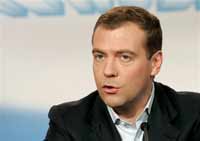Dmitry Medvedev beats Putin's voting record set in 2004
Dmitry Medvedev beat the voting record of Vladimir Putin which he set during the presidential election of 2004. Medveved received the support of over 70 percent of Russian voters which makes 51 million 628 thousand 360 electors. Putin set his record in 2004 when 49 million 465 thousand 238 Russians voted for him.

Gennady Zyuganov, the leader of the Communist Party of the Russian Federation follows Medvedev far behind with 17.77 percent of votes. Vladimir Zhirinovsky, the leader of the Liberal and Democratic Party of Russia (LDPR) comes third with 9.37 percent. Andrei Bogdanov, the leader of the Democratic Party of Russia, closes the list with only 1.29 percent.
The government of the Russian Federation will resign on the inauguration day of the new president.
On Monday night Dmitry Medvedev held a press conference in his election headquarters. Answering a question from a BBC correspondent pertaining to the strategy and the course of Russia’s foreign policy, Medvedev said:
“It is the president who determines the foreign policy of Russia, as the Constitution stipulates. The Kremlin is the office of the Russian president, the place of his permanent location. The White House is the office of the government and the place of the permanent location for its chairman, the prime minister,” he said.
“I believe that we must conduct independent foreign policies similar to what we have been doing during the recent eight years. The major goal of Russia’s foreign policy is to defend Russian interests within the scope of existing international legal norms,” Medvedev said.
Medvedev said that he was expecting to run efficient work with Vladimir Putin as the prime minister.
The main outstanding question was who would be calling Russia's shots once Medvedev takes over and, as is widely expected, names Putin prime minister. The outside world will watch closely how the new leadership in Russia, with its immense oil and gas reserves, engages with global rivals and partners at a time of rising commodities prices.
Most Russians expect the mild-mannered Medvedev to follow Putin's lead, at least at first.
In his rhetoric, Medvedev has presented himself as a pro-business liberal and more Western-leaning face to the rest of the world. But he has also helped implement Putin's drive to give the Kremlin a near monopoly on political power and energy resources.
Medvedev ran against three rivals apparently permitted on the ballot because of their loyalty to the Kremlin line. But Communist Party candidate Gennady Zyuganov and ultranationalist candidate Vladimir Zhirinovsky still alleged violations after the voting ended.
As a key implementer of Putin's polices, Medvedev is seen as unlikely to alter Putin's assertive stance with the West, reduce state control over Russia's mineral riches or allow more real opposition movements to flourish.
"Our candidate, Dmitry Anatolyevich Medvedev, has taken a firm lead," Putin said late Sunday, appearing alongside his protege at a celebration at Red Square outside the Kremlin.
"We will increase stability, improve the quality of life and move forward on the path we have chosen," Medvedev said. "We will be able to preserve the course of President Putin."
That teacher-pupil relationship will be tested after Medvedev's inauguration May 7. Medvedev has said he would propose making Putin his prime minister, and Putin has said he will accept the offer. But in Russia, the premier wields significantly less power than the president, and Putin may find his new chair confining, the AP reports.
One early sign could be the July summit of the Group of Eight leading industrialized nations: If Putin goes alone or accompanies Medvedev, that could signal his reluctance to relinquish control.
Some officials who know Medvedev say privately that he is tougher than his appearance and demeanor may suggest and could show more resolve after his inauguration. Russian history also shows that rulers often like to get rid of those who backed their ascent to power.
Medvedev will be the first Russian leader to succeed his predecessor according to a constitutional timetable; Putin became acting president first after Russia's first president, Boris Yeltsin, stepped down early, and only later won election.
AP photo
Subscribe to Pravda.Ru Telegram channel, Facebook, RSS!


